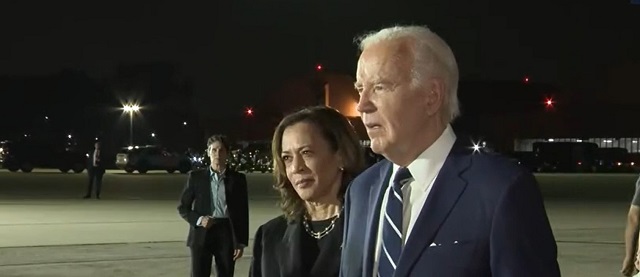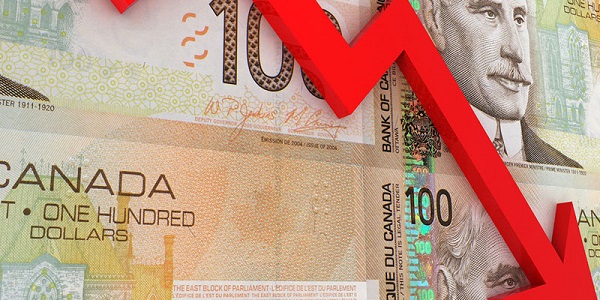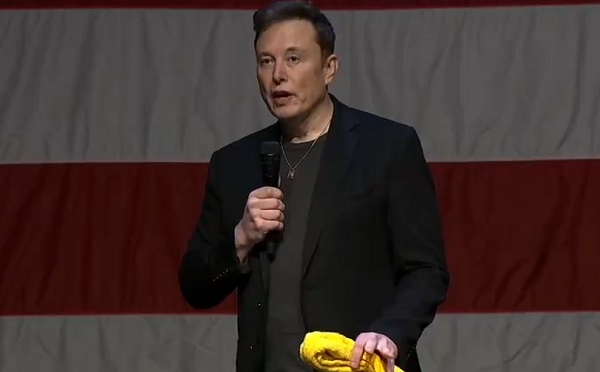Business
Biden Admin Reportedly Throws Support Behind UN Push To Decrease Global Plastic Production

 From the Daily Caller News Foundation
From the Daily Caller News Foundation
By Nick Pope
“If the Biden-Harris Administration wants to meet its sustainable development and climate change goals, the world will need to rely on plastic more, not less. Plastics enable solar and wind energy, are critical to modern healthcare, deliver clean drinking water, reduce home, building and transportation energy needs, and help prevent food wastage.”
The Biden administration is reportedly now in favor of a United Nations-led effort to reduce global plastic production, according to multiple reports.
U.S. officials now reportedly support a developing U.N. treaty that would aim to impose a cap on plastic production worldwide, a shift from its earlier position of allowing countries to determine production levels for themselves, sources familiar with the matter told Reuters and Politico. Biden administration officials have also reportedly signaled that they will support measures to target particular types of plastics and establish a list of specific chemicals to address with new, uniform obligations.
Senior White House Council on Environmental Quality (CEQ) official Jonathan Black reportedly informed industry stakeholders and environmental activists of the shift in position during two private meetings that were closed to the media, according to Politico. Reuters first reported on the administration’s pivot on the UN plastic treaty on Wednesday, and CEQ spokesperson Justin Weiss confirmed the outlet’s reporting in subsequent correspondence with Politico.
It is currently unclear exactly how such a treaty would actually be enforced if adopted.
Prior to the administration’s position shift, U.S. officials had endorsed a more “flexible” approach rather than a global cap on plastic production and had not offered much indication as to whether or not the Biden administration supported an effort to crack down on specific chemicals, according to Politico. Negotiations on the U.N. treaty are still ongoing and are expected to conclude at a November conference in Busan, South Korea; that meeting will take place after Nov. 5’s U.S. presidential election, according to Reuters.
The Biden administration’s reported change of position on the matter now aligns the U.S. with countries like South Korea, the European Union’s member states, Canada and Peru, according to Reuters. Nations that are major petrochemical producers, like China and Saudi Arabia, have attempted to block further discussions about a possible cap on global plastic production and instead want countries to focus on less divisive initiatives, such as improving waste management.
“As the White House caves to the wishes of extreme NGO groups, it does a disservice towards our mutual ambition for a cleaner, lower carbon future where used plastic doesn’t become pollution in the first place,” Chris Jahn, president and CEO of the American Chemistry Council, said of the pivot in a Wednesday statement. “If the Biden-Harris Administration wants to meet its sustainable development and climate change goals, the world will need to rely on plastic more, not less. Plastics enable solar and wind energy, are critical to modern healthcare, deliver clean drinking water, reduce home, building and transportation energy needs, and help prevent food wastage.”
Meanwhile, Greenpeace — a major environmental group — is pleased to see the Biden administration harden its stance on a global plastic production cap.
“This shift in U.S. policy is crucial for creating the unified approach needed to tackle the plastics crisis,” Greenpeace USA Oceans Campaign Director John Hocevar said in a Wednesday statement. “By supporting global criteria for phasing out harmful chemicals and avoidable plastic products, the U.S. is helping to ensure that the treaty will have the teeth needed to protect families and ecosystems alike. It is a welcome signal that they are finally listening to the demands of the American people, almost two-thirds of whom support a Global Plastics Treaty that would ban single-use plastic packaging.”
Neither the White House nor the CEQ responded immediately to requests for comment.
Alberta
Alberta’s fiscal update projects budget surplus, but fiscal fortunes could quickly turn

From the Fraser Institute
By Tegan Hill
According to the recent mid-year update tabled Thursday, the Smith government projects a $4.6 billion surplus in 2024/25, up from the $2.9 billion surplus projected just a few months ago. Despite the good news, Premier Smith must reduce spending to avoid budget deficits.
The fiscal update projects resource revenue of $20.3 billion in 2024/25. Today’s relatively high—but very volatile—resource revenue (including oil and gas royalties) is helping finance today’s spending and maintain a balanced budget. But it will not last forever.
For perspective, in just the last decade the Alberta government’s annual resource revenue has been as low as $2.8 billion (2015/16) and as high as $25.2 billion (2022/23).
And while the resource revenue rollercoaster is currently in Alberta’s favor, Finance Minister Nate Horner acknowledges that “risks are on the rise” as oil prices have dropped considerably and forecasters are projecting downward pressure on prices—all of which impacts resource revenue.
In fact, the government’s own estimates show a $1 change in oil prices results in an estimated $630 million revenue swing. So while the Smith government plans to maintain a surplus in 2024/25, a small change in oil prices could quickly plunge Alberta back into deficit. Premier Smith has warned that her government may fall into a budget deficit this fiscal year.
This should come as no surprise. Alberta’s been on the resource revenue rollercoaster for decades. Successive governments have increased spending during the good times of high resource revenue, but failed to rein in spending when resource revenues fell.
Previous research has shown that, in Alberta, a $1 increase in resource revenue is associated with an estimated 56-cent increase in program spending the following fiscal year (on a per-person, inflation-adjusted basis). However, a decline in resource revenue is not similarly associated with a reduction in program spending. This pattern has led to historically high levels of government spending—and budget deficits—even in more recent years.
Consider this: If this fiscal year the Smith government received an average level of resource revenue (based on levels over the last 10 years), it would receive approximately $13,000 per Albertan. Yet the government plans to spend nearly $15,000 per Albertan this fiscal year (after adjusting for inflation). That’s a huge gap of roughly $2,000—and it means the government is continuing to take big risks with the provincial budget.
Of course, if the government falls back into deficit there are implications for everyday Albertans.
When the government runs a deficit, it accumulates debt, which Albertans must pay to service. In 2024/25, the government’s debt interest payments will cost each Albertan nearly $650. That’s largely because, despite running surpluses over the last few years, Albertans are still paying for debt accumulated during the most recent string of deficits from 2008/09 to 2020/21 (excluding 2014/15), which only ended when the government enjoyed an unexpected windfall in resource revenue in 2021/22.
According to Thursday’s mid-year fiscal update, Alberta’s finances continue to be at risk. To avoid deficits, the Smith government should meaningfully reduce spending so that it’s aligned with more reliable, stable levels of revenue.
Author:
Alberta
Alberta fiscal update: second quarter is outstanding, challenges ahead

Alberta maintains a balanced budget while ensuring pressures from population growth are being addressed.
Alberta faces rising risks, including ongoing resource volatility, geopolitical instability and rising pressures at home. With more than 450,000 people moving to Alberta in the last three years, the province has allocated hundreds of millions of dollars to address these pressures and ensure Albertans continue to be supported. Alberta’s government is determined to make every dollar go further with targeted and responsible spending on the priorities of Albertans.
The province is forecasting a $4.6 billion surplus at the end of 2024-25, up from the $2.9 billion first quarter forecast and $355 million from budget, due mainly to higher revenue from personal income taxes and non-renewable resources.
Given the current significant uncertainty in global geopolitics and energy markets, Alberta’s government must continue to make prudent choices to meet its responsibilities, including ongoing bargaining for thousands of public sector workers, fast-tracking school construction, cutting personal income taxes and ensuring Alberta’s surging population has access to high-quality health care, education and other public services.
“These are challenging times, but I believe Alberta is up to the challenge. By being intentional with every dollar, we can boost our prosperity and quality of life now and in the future.”
Midway through 2024-25, the province has stepped up to boost support to Albertans this fiscal year through key investments, including:
- $716 million to Health for physician compensation incentives and to help Alberta Health Services provide services to a growing and aging population.
- $125 million to address enrollment growth pressures in Alberta schools.
- $847 million for disaster and emergency assistance, including:
- $647 million to fight the Jasper wildfires
- $163 million for the Wildfire Disaster Recovery Program
- $5 million to support the municipality of Jasper (half to help with tourism recovery)
- $12 million to match donations to the Canadian Red Cross
- $20 million for emergency evacuation payments to evacuees in communities impacted by wildfires
- $240 million more for Seniors, Community and Social Services to support social support programs.
Looking forward, the province has adjusted its forecast for the price of oil to US$74 per barrel of West Texas Intermediate. It expects to earn more for its crude oil, with a narrowing of the light-heavy differential around US$14 per barrel, higher demand for heavier crude grades and a growing export capacity through the Trans Mountain pipeline. Despite these changes, Alberta still risks running a deficit in the coming fiscal year should oil prices continue to drop below $70 per barrel.
After a 4.4 per cent surge in the 2024 census year, Alberta’s population growth is expected to slow to 2.5 per cent in 2025, lower than the first quarter forecast of 3.2 per cent growth because of reduced immigration and non-permanent residents targets by the federal government.
Revenue
Revenue for 2024-25 is forecast at $77.9 billion, an increase of $4.4 billion from Budget 2024, including:
- $16.6 billion forecast from personal income taxes, up from $15.6 billion at budget.
- $20.3 billion forecast from non-renewable resource revenue, up from $17.3 billion at budget.
Expense
Expense for 2024-25 is forecast at $73.3 billion, an increase of $143 million from Budget 2024.
Surplus cash
After calculations and adjustments, $2.9 billion in surplus cash is forecast.
- $1.4 billion or half will pay debt coming due.
- The other half, or $1.4 billion, will be put into the Alberta Fund, which can be spent on further debt repayment, deposited into the Alberta Heritage Savings Trust Fund and/or spent on one-time initiatives.
Contingency
Of the $2 billion contingency included in Budget 2024, a preliminary allocation of $1.7 billion is forecast.
Alberta Heritage Savings Trust Fund
The Alberta Heritage Savings Trust Fund grew in the second quarter to a market value of $24.3 billion as of Sept. 30, 2024, up from $23.4 billion at the end of the first quarter.
- The fund earned a 3.7 per cent return from July to September with a net investment income of $616 million, up from the 2.1 per cent return during the first quarter.
Debt
Taxpayer-supported debt is forecast at $84 billion as of March 31, 2025, $3.8 billion less than estimated in the budget because the higher surplus has lowered borrowing requirements.
- Debt servicing costs are forecast at $3.2 billion, down $216 million from budget.
Related information
-

 Brownstone Institute2 days ago
Brownstone Institute2 days agoThe Most Devastating Report So Far
-

 Business2 days ago
Business2 days agoCarbon tax bureaucracy costs taxpayers $800 million
-

 ESG2 days ago
ESG2 days agoCan’t afford Rent? Groceries for your kids? Trudeau says suck it up and pay the tax!
-

 John Stossel2 days ago
John Stossel2 days agoGreen Energy Needs Minerals, Yet America Blocks New Mines
-

 Daily Caller2 days ago
Daily Caller2 days agoLos Angeles Passes ‘Sanctuary City’ Ordinance In Wake Of Trump’s Deportation Plan
-

 Alberta2 days ago
Alberta2 days agoProvince considering new Red Deer River reservoir east of Red Deer
-

 Addictions1 day ago
Addictions1 day agoBC Addictions Expert Questions Ties Between Safer Supply Advocates and For-Profit Companies
-

 Aristotle Foundation1 day ago
Aristotle Foundation1 day agoToronto cancels history, again: The irony and injustice of renaming Yonge-Dundas Square to Sankofa Square





